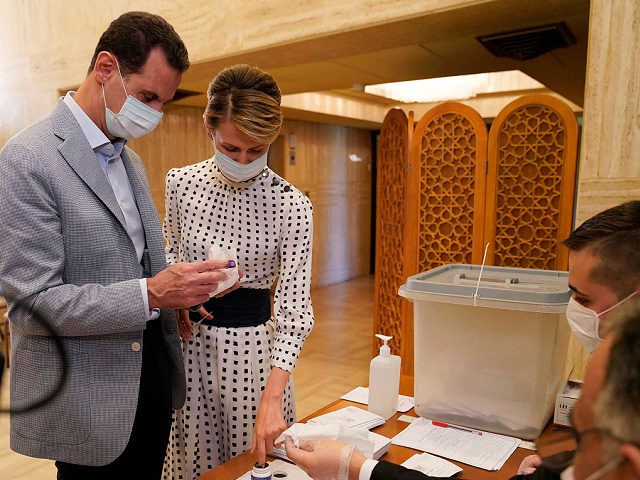Syrian dictator Bashar al-Assad has tested positive for the Chinese coronavirus along with his wife, Asma, the Syrian president’s office announced Monday.
Assad and his wife underwent polymerase chain reaction (PCR) tests for the Chinese coronavirus recently after suffering from mild symptoms similar to those of the virus and their results came back positive.
“Bashar al-Assad and Mrs. Asma al-Assad are infected with the coronavirus, and they are in a good health and in a stable condition,” the Presidency of the Syrian Arab Republic wrote in a statement posted online on March 8.
“They will continue their work during their home quarantine period, which will last for two or three weeks,” the office added.
The Syrian government has not publicly announced any other developments in terms of Assad’s health in recent months.
Assad, 55, was forced to halt mid-speech during an address to Syria’s Parliament in August 2020. He told legislators he needed to “sit down for a minute” after suffering a drop in blood pressure, according to Syrian state media.
“This was a result of a small drop in blood pressure that Mr President [Assad] suffered before he resumed his speech normally,” Syrian state TV said when reporting on the unexpected interruption during the public address.
Assad’s wife, Asma, 45, underwent treatment for breast cancer in 2018. The office of the Syrian presidency said at the time that Asma’s cancer had been detected early. Asma told Syrian state TV in August 2019 that she had fully recovered from the disease after receiving chemotherapy at a Syrian military hospital. Bashar al-Assad served as a Syrian Army doctor after graduating with a medical degree from the University of Damascus in 1988. He later pursued post-graduate studies in ophthalmology in London in the early 1990s before becoming Syria’s president in 2000.
The Syrian government has reported 16,042 cases and 1,068 deaths from the Chinese coronavirus since the start of Syria’s coronavirus outbreak early last year. Over a decade of civil war in Syria has nearly collapsed the country’s healthcare system, battered the nation’s economy, and forced most medical workers out of the region. Assad’s regime does not control much of the Syrian state, including territories largely held by Kurdish groups allied with the United States and areas destroyed by what was once the Islamic State “caliphate.” This coupled with the Syrian regime’s limited testing capability for coronavirus means that the Arab nation’s coronavirus caseload is likely much higher than officially reported.
“It is not possible in Syria to test everybody concerning PCR, there is a total shortage of PCR kits, we don’t get enough to test everybody,” Khaled Hboubati, the president of the Syrian Arab Red Crescent – a humanitarian nonprofit and member of the international Red Cross organization – said from Damascus during a virtual press briefing last week.
Syria’s failing economy has prevented the country’s government from enforcing strict lockdowns to contain the spread of coronavirus despite a surge in new cases since mid-February, a member of Syria’s coronavirus advisory committee said last week.
“Starting February 10th or around that time we started seeing a spike in cases,” Dr. Nabough al-Awa told Reuters on March 4.
“I don’t have accurate percentages as I’m only one doctor … but I also talk to my colleagues. If I was seeing in my clinic two or three cases a day last year now I am seeing five or six,” he said.
The Syrian government said on March 1 that it had begun administering coronavirus vaccinations to frontline healthcare workers. Syrian government officials said on February 25 that Syria had received coronavirus vaccines from a “friendly country” but did not name the donor. Syrian health authorities had previously said Damascus was negotiating with Russia and China to receive coronavirus vaccine candidates, though no formal bilateral agreement on the subject was announced.

COMMENTS
Please let us know if you're having issues with commenting.